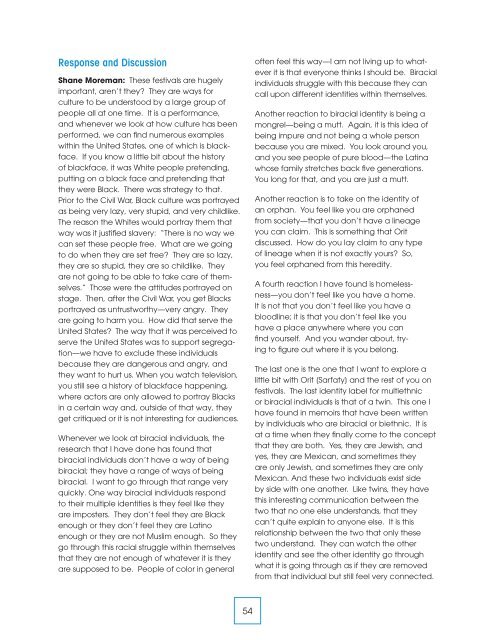The New Face of Arts Leadership in the West - westaf - The Western ...
The New Face of Arts Leadership in the West - westaf - The Western ...
The New Face of Arts Leadership in the West - westaf - The Western ...
You also want an ePaper? Increase the reach of your titles
YUMPU automatically turns print PDFs into web optimized ePapers that Google loves.
Response and Discussion<br />
Shane Moreman: <strong>The</strong>se festivals are hugely<br />
important, aren’t <strong>the</strong>y? <strong>The</strong>y are ways for<br />
culture to be understood by a large group <strong>of</strong><br />
people all at one time. It is a performance,<br />
and whenever we look at how culture has been<br />
performed, we can f<strong>in</strong>d numerous examples<br />
with<strong>in</strong> <strong>the</strong> United States, one <strong>of</strong> which is blackface.<br />
If you know a little bit about <strong>the</strong> history<br />
<strong>of</strong> blackface, it was White people pretend<strong>in</strong>g,<br />
putt<strong>in</strong>g on a black face and pretend<strong>in</strong>g that<br />
<strong>the</strong>y were Black. <strong>The</strong>re was strategy to that.<br />
Prior to <strong>the</strong> Civil War, Black culture was portrayed<br />
as be<strong>in</strong>g very lazy, very stupid, and very childlike.<br />
<strong>The</strong> reason <strong>the</strong> Whites would portray <strong>the</strong>m that<br />
way was it justified slavery: “<strong>The</strong>re is no way we<br />
can set <strong>the</strong>se people free. What are we go<strong>in</strong>g<br />
to do when <strong>the</strong>y are set free? <strong>The</strong>y are so lazy,<br />
<strong>the</strong>y are so stupid, <strong>the</strong>y are so childlike. <strong>The</strong>y<br />
are not go<strong>in</strong>g to be able to take care <strong>of</strong> <strong>the</strong>mselves.”<br />
Those were <strong>the</strong> attitudes portrayed on<br />
stage. <strong>The</strong>n, after <strong>the</strong> Civil War, you get Blacks<br />
portrayed as untrustworthy—very angry. <strong>The</strong>y<br />
are go<strong>in</strong>g to harm you. How did that serve <strong>the</strong><br />
United States? <strong>The</strong> way that it was perceived to<br />
serve <strong>the</strong> United States was to support segregation—we<br />
have to exclude <strong>the</strong>se <strong>in</strong>dividuals<br />
because <strong>the</strong>y are dangerous and angry, and<br />
<strong>the</strong>y want to hurt us. When you watch television,<br />
you still see a history <strong>of</strong> blackface happen<strong>in</strong>g,<br />
where actors are only allowed to portray Blacks<br />
<strong>in</strong> a certa<strong>in</strong> way and, outside <strong>of</strong> that way, <strong>the</strong>y<br />
get critiqued or it is not <strong>in</strong>terest<strong>in</strong>g for audiences.<br />
Whenever we look at biracial <strong>in</strong>dividuals, <strong>the</strong><br />
research that I have done has found that<br />
biracial <strong>in</strong>dividuals don’t have a way <strong>of</strong> be<strong>in</strong>g<br />
biracial; <strong>the</strong>y have a range <strong>of</strong> ways <strong>of</strong> be<strong>in</strong>g<br />
biracial. I want to go through that range very<br />
quickly. One way biracial <strong>in</strong>dividuals respond<br />
to <strong>the</strong>ir multiple identities is <strong>the</strong>y feel like <strong>the</strong>y<br />
are imposters. <strong>The</strong>y don’t feel <strong>the</strong>y are Black<br />
enough or <strong>the</strong>y don’t feel <strong>the</strong>y are Lat<strong>in</strong>o<br />
enough or <strong>the</strong>y are not Muslim enough. So <strong>the</strong>y<br />
go through this racial struggle with<strong>in</strong> <strong>the</strong>mselves<br />
that <strong>the</strong>y are not enough <strong>of</strong> whatever it is <strong>the</strong>y<br />
are supposed to be. People <strong>of</strong> color <strong>in</strong> general<br />
<strong>of</strong>ten feel this way—I am not liv<strong>in</strong>g up to whatever<br />
it is that everyone th<strong>in</strong>ks I should be. Biracial<br />
<strong>in</strong>dividuals struggle with this because <strong>the</strong>y can<br />
call upon different identities with<strong>in</strong> <strong>the</strong>mselves.<br />
Ano<strong>the</strong>r reaction to biracial identity is be<strong>in</strong>g a<br />
mongrel—be<strong>in</strong>g a mutt. Aga<strong>in</strong>, it is this idea <strong>of</strong><br />
be<strong>in</strong>g impure and not be<strong>in</strong>g a whole person<br />
because you are mixed. You look around you,<br />
and you see people <strong>of</strong> pure blood—<strong>the</strong> Lat<strong>in</strong>a<br />
whose family stretches back five generations.<br />
You long for that, and you are just a mutt.<br />
Ano<strong>the</strong>r reaction is to take on <strong>the</strong> identity <strong>of</strong><br />
an orphan. You feel like you are orphaned<br />
from society—that you don’t have a l<strong>in</strong>eage<br />
you can claim. This is someth<strong>in</strong>g that Orit<br />
discussed. How do you lay claim to any type<br />
<strong>of</strong> l<strong>in</strong>eage when it is not exactly yours? So,<br />
you feel orphaned from this heredity.<br />
A fourth reaction I have found is homelessness—you<br />
don’t feel like you have a home.<br />
It is not that you don’t feel like you have a<br />
bloodl<strong>in</strong>e; it is that you don’t feel like you<br />
have a place anywhere where you can<br />
f<strong>in</strong>d yourself. And you wander about, try<strong>in</strong>g<br />
to figure out where it is you belong.<br />
<strong>The</strong> last one is <strong>the</strong> one that I want to explore a<br />
little bit with Orit [Sarfaty] and <strong>the</strong> rest <strong>of</strong> you on<br />
festivals. <strong>The</strong> last identity label for multiethnic<br />
or biracial <strong>in</strong>dividuals is that <strong>of</strong> a tw<strong>in</strong>. This one I<br />
have found <strong>in</strong> memoirs that have been written<br />
by <strong>in</strong>dividuals who are biracial or biethnic. It is<br />
at a time when <strong>the</strong>y f<strong>in</strong>ally come to <strong>the</strong> concept<br />
that <strong>the</strong>y are both. Yes, <strong>the</strong>y are Jewish, and<br />
yes, <strong>the</strong>y are Mexican, and sometimes <strong>the</strong>y<br />
are only Jewish, and sometimes <strong>the</strong>y are only<br />
Mexican. And <strong>the</strong>se two <strong>in</strong>dividuals exist side<br />
by side with one ano<strong>the</strong>r. Like tw<strong>in</strong>s, <strong>the</strong>y have<br />
this <strong>in</strong>terest<strong>in</strong>g communication between <strong>the</strong><br />
two that no one else understands, that <strong>the</strong>y<br />
can’t quite expla<strong>in</strong> to anyone else. It is this<br />
relationship between <strong>the</strong> two that only <strong>the</strong>se<br />
two understand. <strong>The</strong>y can watch <strong>the</strong> o<strong>the</strong>r<br />
identity and see <strong>the</strong> o<strong>the</strong>r identity go through<br />
what it is go<strong>in</strong>g through as if <strong>the</strong>y are removed<br />
from that <strong>in</strong>dividual but still feel very connected.<br />
54


